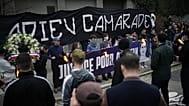Namibian politician Adolf Hitler Uunona has retained his seat in his small northern constituency yet again despite his controversial name.
A local politician in Namibia who shares his name with Nazi Germany's notorious leader has retained his seat for the fifth time in a row, after reportedly winning the Wednesday local elections in his constituency.
 ADVERTISEMENT
ADVERTISEMENT
 ADVERTISEMENT
ADVERTISEMENT
Adolf Hitler Uunona has represented Ompundja in the Oshana region since 2004 as a member of the South West Africa People's Organisation, or SWAPO.
While Namibia's Electoral Commission has yet to release the official vote count, Uunona won by a large margin, according to multiple reports.
The 59-year-old has been a popular figure in the small northern constituency of less than 5,000 residents despite his namesake’s legacy, winning the election with 85% of the vote in 2020.
As regional councilor, he has been lauded for his grassroots work and anti-apartheid efforts, domestic media reported.
In an interview with German newspaper Bild in 2020 — when he won his fourth mandate — Uunona said he had “nothing to do” with Nazi ideology.
He also rejected any notion of world domination.
"It wasn't until I was growing up that I realised: This man wanted to subjugate the whole world," Uunona said. “I have nothing to do with any of these things."
He explained that his father named him after the notorious Nazi leader responsible for the Holocaust. However, Uunona pointed out that “he probably did not understand” what it meant.
"As a child I saw it as a totally normal name," Uunona insisted. “It does not mean I have Adolf Hitler's character or resemble that of Adolf Hitler of Germany,” he told Namibian press in a separate interview.
He goes by the name Adolf Uunona in his daily life, but he maintains he has no plans to change it, as it is “too late for that”.
The centre-left SWAPO party originated in the Namibian liberation movement. It campaigns on anti-colonial politics, including the rejection of white-minority governance. In recent years, the party has shifted towards the centre and market-oriented policies.
Namibia was once a German colony and part of German South West Africa, and Germanic names like Adolf remain common.
After World War I, it was under South African control until its independence in 1990.














